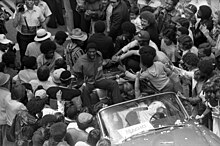 A crowd surrounds Magic Johnson at the Lakers championship parade | ||||||||||
| ||||||||||
| Dates | May 4–16 | |||||||||
|---|---|---|---|---|---|---|---|---|---|---|
| MVP | Magic Johnson (Los Angeles Lakers) | |||||||||
| Hall of Famers | Lakers: Kareem Abdul-Jabbar (1995) Michael Cooper (2024) Spencer Haywood (2015) Magic Johnson (2002) Jamaal Wilkes (2012) 76ers: Maurice Cheeks (2018) Doug Collins (2024; did not play) Julius Erving (1993) Bobby Jones (2019) Coaches (assistant coaches): Chuck Daly (1994) Pat Riley (2008) Officials: Darell Garretson (2016) Earl Strom (1995) | |||||||||
| Eastern Finals | 76ers defeated Celtics, 4–1 | |||||||||
| Western Finals | Lakers defeated SuperSonics, 4–1 | |||||||||
The 1980 NBA World Championship Series was the championship round of the National Basketball Association (NBA)'s 1979–80 season, and the conclusion of the season's playoffs. The Western Conference champion Los Angeles Lakers defeated the Eastern Conference champion Philadelphia 76ers 4 games to 2 to win their seventh championship.[1]
Kareem Abdul-Jabbar was the league's MVP, but midway through Game 5, the Lakers center suffered a severely sprained ankle.[2] He managed to come back in the game in the fourth quarter to lead the Lakers to victory and a 3–2 lead in the best-of-seven series.[2] But the Lakers still had to travel to Philadelphia for Game 6. Abdul-Jabbar was listed as out of Game 6, although 76ers coach Billy Cunningham was quoted as saying "I won't believe he's not playing until their plane lands and he's not on it." As it turned out, Kareem did not make the trip and was listed as doubtful if Game 7 had been needed.
In Game 6, Magic Johnson played what may have been the greatest game of his career. Playing on the road, Johnson (a 6'9" rookie point guard) started the game at center and eventually played all five positions in a dominating performance.[2] Scoring a game-high 42 points and grabbing a game-high 15 rebounds—and handing out seven assists— Johnson led the Lakers to the NBA crown. The Lakers also received strong performances from Jamaal Wilkes with 37 points and 10 rebounds,[3] and Norm Nixon. Jim Chones played strong defense on 76ers center Darryl Dawkins, while Mark Landsberger provided rebounding off the bench, and little used Brad Holland chipped in eight key points.
Magic Johnson's performance in Game 6 and the series earned him the 1980 NBA Finals Most Valuable Player (MVP). What made Johnson's performance even more remarkable was that he was an NBA rookie—and, indeed, one who had left college after only two years, and was only 20 years old. "Jamaal Wilkes had an unbelievable game", said Johnson in 2011. "Everybody talked about my 42 points, but it was also his 37-point effort."[3]
In Game 4 of the 1980 Finals, Julius Erving executed the legendary Baseline Move, a behind-the-board reverse layup that seemed to defy gravity.[4] Play-by-play announcer Brent Musburger has noted that Erving made such moves almost routinely in his ABA days—but the ABA had no national TV contract in those days.[5] This Game 4 move, played to a national audience in a title game, has probably become Julius Erving's most famous move.[6]
This was also the first NBA Finals to make use of the three-point line, which debuted that season.[7]
Many consider this victory as the birth of Showtime.
- ^ "Basketball great, Magic Johnson, plays center as a rookie, wins championships". History. Retrieved June 5, 2020.
- ^ a b c Rhiannon Walker (May 16, 2018). "The day Magic Johnson stepped in at center and dropped 42 points on Philly". Andscape. Retrieved June 5, 2020.
- ^ a b Media, Mark (August 29, 2012). "Magic, Kareem among Jamaal Wilkes' presenters at Hall of Fame". Los Angeles Times. Archived from the original on September 3, 2012. Retrieved September 1, 2012.
- ^ "Top NBA Finals moments: Erving's amazing baseline reverse layup". National Basketball Association. May 17, 2017. Retrieved June 5, 2020.
- ^ Matt Christopher (October 1, 2009). Greatest Moments in Basketball History. Little, Brown Books for Young Readers. ISBN 9780316082488. Retrieved June 5, 2020.
- ^ Brian Chen (May 11, 2015). "35th Anniversary of Dr. J's Iconic Reverse Layup Versus Lakers in NBA Finals". Bleacher Report. Retrieved June 5, 2020.
- ^ Victor Mather (January 20, 2016). "How the N.B.A. 3-Point Shot Went From Gimmick to Game Changer". The New York Times. Retrieved June 5, 2020.
© MMXXIII Rich X Search. We shall prevail. All rights reserved. Rich X Search
